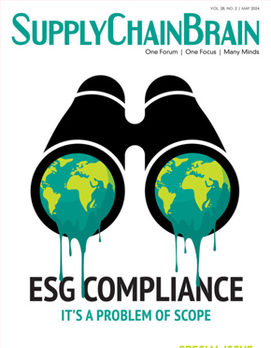
The adoption by logistics providers of modern-day technology is a case of applying digital solutions to an analog world.
By its nature, logistics is intensely physical: trucks, trailers, ships, trains and warehouses. There’s nothing “virtual” about it — the only thing that operates “in the cloud” is an airplane — yet providers are rushing to embrace systems consisting of nothing but bits and bytes.
Their impulse is understandable. In this age of the internet of things, automation is key to coping with the relentless flow of data, all geared toward satisfying escalating customer demands for rapid, pinpoint delivery. To that end, advances like machine learning and artificial intelligence are making possible a degree of “smart” decision-making that’s way beyond the grasp of flesh-and-blood managers.
Technology for logistics makes eminent sense. So why do so many implementations fail to deliver on their promise?
Ali Hasan Raza hails from the physical world. He started out in operations, including 18-wheelers. A decade or so into his career, he began migrating to technology, including systems for tracking and tracing, and monitoring the movement of trucks. Today he is co-founder and chief executive officer of ThroughPut Inc., a vendor of software that draws on AI to help relieve operational bottlenecks.
As the leader of a tech company, Raza sees the value of automation for logistics providers. But he’s also acutely aware of the disconnect that attends its real-world implementation. Simply put, he says, the nature and value of digital technologies “depend on who the end user is.” Truckers seek out point-based solutions that address everyday operations. Brokers are drawn to electronic marketplaces that link shippers with physical-services providers. Big retailers like Walmart Inc. and Amazon.com Inc. favor systems that enable end-to-end supply-flow.
So while the word “digital” is all-embracing, it can also be maddeningly vague, describing a broad range of “solutions” for users that are lumped under the equally nebulous term “logistics.”
Big enterprise-oriented systems start out with a number of key assumptions, notes Raza. They’re designed to model the real world, including expected lead times, vehicle capacity, packaging requirements, material-handling equipment and product mix. But digitally based planning systems are most comfortable when working with a steady state, rather than a transient model. And the world of logistics is decidedly transient.
“If you work in logistics and supply chain, every day changes,” says Raza. “You don’t have fixed lead times and capacity. Bottlenecks are always changing, especially during COVID-19, where warehouses and factories are shutting down, requiring entire route-optimization changes.”
In a chaotic environment, even the most carefully thought-out systems end up not reflecting the actual flow of operations. “That’s why we see these digital transformations failing,” says Raza. “The only way to build something is to make assumptions. As in math, you start out with basic equations. But the fewer assumptions you make, the more freedom you have.”
Weren’t AI and machine learning designed expressly to cope with such uncertainty? Raza agrees that AI can be employed to sense actual demand and product mix, and plan backward from that. “It can provide recommendations in real time,” he says, “but someone still has to execute on them.” Which is when the realities of the moment threaten to intrude on the best-laid plans of an “intelligent” machine.
Total automation of a logistics operation is rare in any case, restricted to the odd “lights-out” warehouse handling highly specialized product. Such a setup invites the possibility of the bullwhip effect, where small, uncorrected miscalculations along the supply chain can escalate and result in disastrous service failures downstream.
The irony of technology is that its success within an organization depends, in the final analysis, on humans. The problem, says Raza, is often one of corporate culture.
“Technology can only make stuff you’re doing already go faster,” he says. “If you don’t have a data-driven culture to being with, and have never done anything with your data, you’re not going to add any value.”
Training — of people, not machines — is of equal importance. Any organization that seeks to rip out old processes without adequately schooling staff in the new one is bound to see its expensive tech initiative fail. Top executives, meanwhile, need to be realistic about their return on investment, even as they encounter pressure from investors to show ever-increasing quarterly profits. In such a scenario, the adoption of software-as-a-service offerings can help to alleviate up-front costs.
There’s no question that the physical world of logistics needs virtual capabilities, in the form of automated and predictive systems, to get the most from its substantial capital outlay. But the way in which those “solutions” are applied can spell the difference between success and failure. As Raza puts it: “Technology is an enabler — not a solution.”







